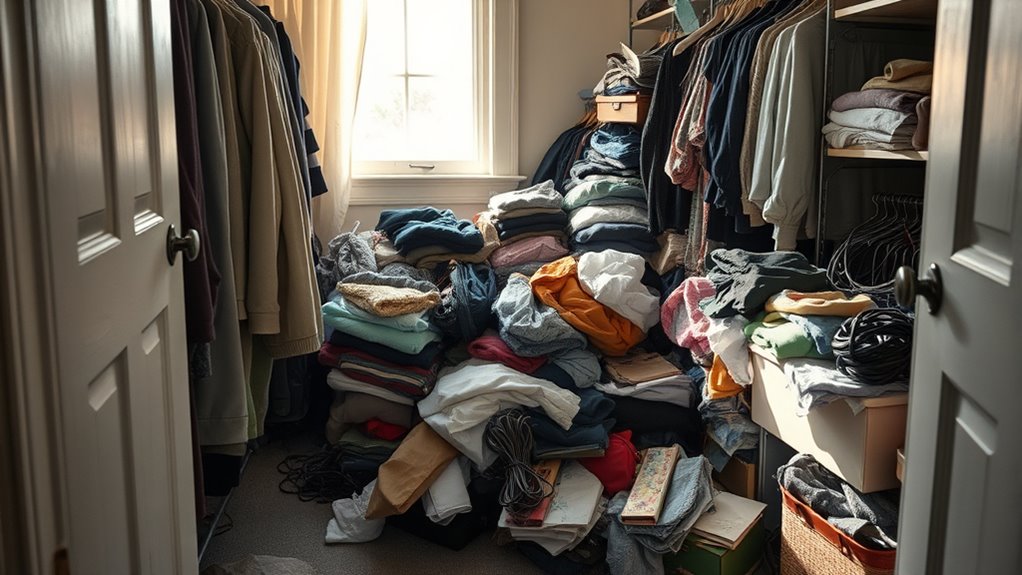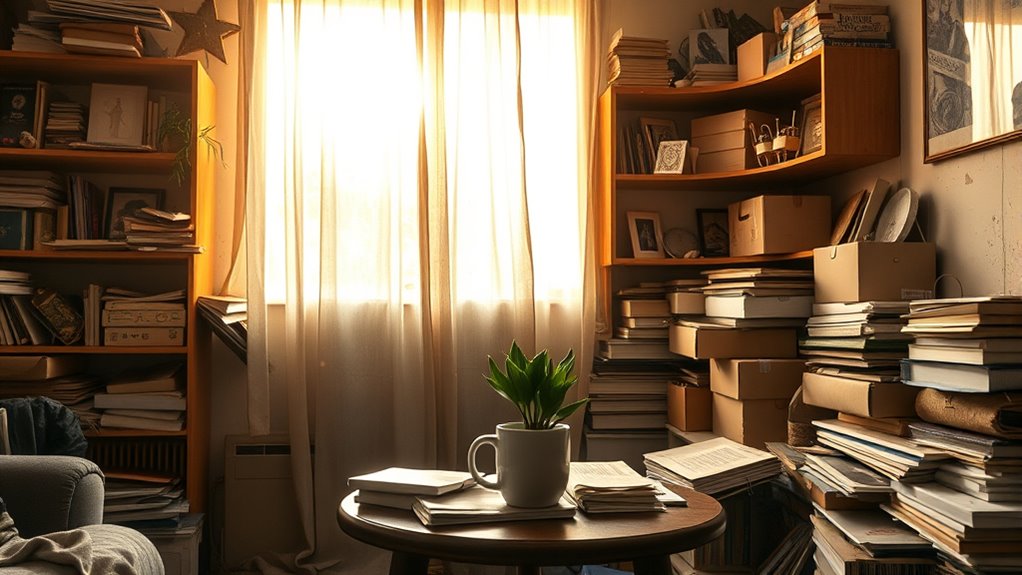You keep items not just out of practicality but because they’re emotionally tied to memories, gifts, or your sense of identity, making letting go feel like losing a part of yourself. Decision fatigue from sorting through many possessions adds to the challenge, fostering avoidance and clutter. Recognizing these emotional attachments and understanding their influence can help you move forward confidently. If you want to explore how these psychological factors shape your clutter habits, there’s more to uncover.
Key Takeaways
- Emotional attachments to possessions serve as anchors to memories, making it hard to part with items we associate with significant moments.
- Decision fatigue from multiple choices during decluttering leads to avoidance and difficulty in letting go of unused belongings.
- Possessions symbolize personal identity and security, reinforcing self-image and making it challenging to discard items that represent stability.
- Psychological barriers like guilt and emotional knots create overwhelm, delaying decluttering efforts and perpetuating clutter buildup.
- Recognizing emotional ties and approaching decluttering as untangling these knots helps us prioritize meaningful possessions and create mental clarity.

Have you ever wondered why clutter can feel overwhelming even when you’re not consciously aware of it? The answer lies deep within your mind, rooted in emotional attachment and decision fatigue. When you hold onto items because they carry memories or symbolize certain moments, you’re creating a mental barrier that’s hard to break. These possessions become more than just objects; they’re emotional anchors, making it difficult to let go. Each item you keep is a reminder of a past experience, a gift, or a hope for the future, and parting with them can feel like losing a part of yourself. This emotional attachment often clouds your judgment, convincing you that the item has value beyond its practicality, even if you haven’t used it in years.
At the same time, decision fatigue plays a significant role in why you keep stuff you don’t need. Every time you face the task of decluttering, you’re making countless choices—what to keep, what to toss, what to donate. Over time, these decisions drain your mental energy. The more options you have to contemplate, the more exhausted you become, leading to avoidance or procrastination. Instead of facing the difficult task of deciding what’s worth keeping, you might choose to keep everything, simply to avoid the discomfort of making tough choices. This cycle creates a cluttered environment that feels harder and harder to organize, reinforcing the emotional weight tied to your possessions.
Your brain tends to associate possessions with identity and security. When you keep items because of emotional attachment, you’re fundamentally holding onto a piece of your identity or a comforting memory. Meanwhile, decision fatigue saps your ability to rationally evaluate whether those items serve a purpose in your life now. As a result, clutter accumulates, and you might feel trapped in a cycle of guilt and indecision. Recognizing that emotional attachment and decision fatigue are at play can help you understand why letting go feels so difficult. In addition, understanding the influence of emotional attachment on your decision-making process can empower you to approach decluttering with compassion for yourself. Instead of viewing decluttering as a simple task, see it as a process of untangling these emotional knots, giving yourself permission to prioritize what truly matters. By doing so, you create space not just physically, but mentally, allowing you to move forward with clarity and confidence.
Frequently Asked Questions
How Does Emotional Attachment Influence Clutter Habits?
Your emotional attachment, often rooted in sentimental value and attachment theory, heavily influences clutter habits. When you hold onto items because of the memories or feelings they evoke, it becomes harder to let go. This attachment creates a bond that makes parting with belongings feel like losing a piece of yourself. Recognizing these emotional ties helps you understand why you keep clutter and can guide you towards healthier decluttering habits.
Can Decluttering Improve Mental Health?
They say “less is more,” and decluttering can truly boost your mental health. By simplifying your space, you reduce decision fatigue and create a calming environment. Your attachment style influences what you keep, but letting go can foster emotional freedom. Clearing clutter helps you focus, decreases stress, and improves mood — making it a powerful step toward better mental well-being. So, start small and watch your mental clarity grow.
Why Do Some People Feel Guilty Throwing Things Away?
You might feel guilty throwing things away because guilt and shame stem from sentimental value attached to objects. You may believe that discarding certain items means losing memories or betraying loved ones. This emotional attachment makes it hard to let go, even if the item no longer serves a purpose. Recognizing that guilt and shame are normal can help you gradually overcome these feelings, allowing you to declutter with peace of mind.
How Does Childhood Experience Affect Decluttering Tendencies?
They say “you are what you keep,” and childhood memories shape your decluttering habits. Your attachment styles formed early in life influence how easily you let go of possessions. If you experienced loss or inconsistency, you might cling to items for comfort. Recognizing these patterns helps you understand your tendencies, making it easier to declutter with compassion rather than guilt, ultimately creating a space that reflects your growth.
What Psychological Factors Prevent Successful Decluttering?
Psychological factors like attachment avoidance and decision fatigue can prevent you from decluttering successfully. Attachment avoidance makes it hard to let go of items because you might see them as part of your identity or security. Decision fatigue drains your mental energy, making it tougher to make choices about what to keep or discard. Together, these factors create emotional and mental barriers, hindering your decluttering efforts.
Conclusion
Understanding why you cling to unused belongings helps you let go. Imagine Sarah, who held onto childhood toys out of guilt, only to realize they blocked her space and peace. When she finally let them go, her home felt lighter, and her mind clearer. You, too, can experience this freedom. By uncovering the reasons behind your attachments, you create room for growth and happiness. Let go of what no longer serves you—you deserve a clutter-free, peaceful life.









